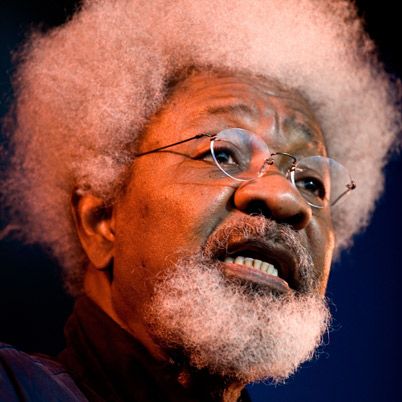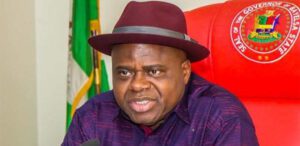
Soyinka, SERAP berate police brutality on protesters, journalists
…Criticise use of live bullets on protesters
…SERAP calls for protection of media freedom
By Ismail Azeez
Outrage and condemnation have trailed the brutal crackdown on protesters and journalists by the Nigerian Police Force, with Nobel laureate Wole Soyinka and the Socio-Economic Rights and Accountability Project (SERAP) leading the chorus of disapproval.
The duo has vehemently denounced the excessive use of force by the police, which has resulted in the injury and arrest of several individuals, including journalists, who were simply exercising their constitutional rights to freedom of expression and assembly.
Professor Wole Soyinka has condemned the attacks on #EndBadGovernance protesters and journalists by security agencies, calling for a lasting transformation in the way security agencies respond to civic protests.
This was contained in a statement on Sunday, Soyinka expressed concern over the Federal Government’s mismanagement of protests.
Soyinka criticised the use of live bullets and tear gas by the Nigeria Police Force to manage civic protests,
He said, “I set my alarm clock for this morning to ensure that I did not miss President Bola Tinubu’s impatiently awaited address to the nation on the current unrest across the nation.
“His outline of the government’s remedial action since inception, aimed at warding off just such an outbreak, will undoubtedly receive expert and sustained attention both for effectiveness and in content analysis. My primary concern, quite predictably, is the continuing deterioration of the state’s seizure of protest management, an area in which the presidential address fell conspicuously short.
“Such short-changing of civic deserving, regrettably, goes to arm the security forces in the exercise of impunity and condemns the nation to a seemingly unbreakable cycle of resentment and reprisals.
“Live bullets as a state response to civic protest – that becomes the core issue. Even tear gas remains questionable in most circumstances, certainly an abuse in situations of clearly peaceful protest. Hunger marches constitute a universal S.O.S., not peculiar to the Nigerian nation. They belong indeed in a class of their own, never mind the collateral claims emblazoned on posters.
“They serve as a summons to governance that a breaking point has been reached and, thus, a testing ground for governance awareness of public desperation. The tragic response to the ongoing hunger marches in parts of the nation, and for which notice was served, constitutes a retrogression that takes the nation even further back than the deadly culmination of the watershed ENDSARS protests.
“It evokes pre-independence – that is, colonial – acts of disdain, a passage that induced the late stage pioneer Hubert Ogunde’s folk opera BREAD AND BULLETS, earning that nationalist serial persecution and proscription by the colonial government.”
He added, “Need we recall the nationwide 2022/23 editions of what is generally known as the YELLOW VEST movement in France? Perhaps it is time to make such scenarios compulsory viewing in policing curriculum. In all of the coverage that I watched, I did not catch one single instance of a gun levelled at protesters, much less fired at them, even during direct physical confrontations.
“The serving of bullets where bread is pleaded is ominous retrogression, and we know what that eventually proves – a prelude to far more desperate upheavals, not excluding revolutions.
“The time is long overdue, surely, to abandon, permanently, the anachronistic resort to lethal means by the security agencies of governance. No nation is so underdeveloped, materially impoverished, or simply internally insecure as to lack the will to set an example. All it takes is to recall its own history, and then exercise the will to commence a lasting transformation, inserting a break in the chain of lethal responses against civic society.
“Today’s marchers may wish to consider adopting the key songs of Hubert Ogunde’s BREAD AND BULLETS if only to inculcate a sense of shame in the continuing failure to transcend the lure of colonial inheritance where we all were at the receiving end. One way or the other, this vicious cycle must be broken.”
Meanwhile, Socio-Economic Rights and Accountability Project (SERAP) has sent an Urgent Appeal to Rt Hon Patricia Scotland QC, Secretary-General of the Commonwealth, urging her to “apply the Commonwealth Charter to hold the Nigerian authorities to account over reports of attacks on journalists covering the #EndHunger protests and peaceful protests in some parts of the country.”
SERAP urged Ms Scotland to “apply the Commonwealth Charter to press the Nigerian authorities to promptly, thoroughly, impartially, independently, transparently and effectively investigate reports of attacks on journalists covering the protests’ in Nigeria and on peaceful protesters.”
SERAP also urged Ms Scotland to “press the Nigerian authorities to publish the outcome of any investigation and to hold suspected perpetrators to account and ensure access to justice and effective remedies for the affected journalists and peaceful protesters for any violations of domestic law and international standards.”
SERAP urged Ms Scotland to “press the Nigerian authorities to uphold the rights of journalists to monitor and report on protests and ensure their safety, as well as ensure that journalists are not detained, threatened, attacked or restricted when covering noteworthy events of interest to the public, such as protests.”
In the Urgent Appeal dated 3 August 2024 and signed by SERAP deputy director Kolawole Oluwadare, the organisation said: “The targeting of journalists with lethal or less-lethal force for doing their work is prohibited under the Nigerian Constitution and international human rights law and contrary to best law enforcement standards.”
SERAP said, “Those violating such standards must be subject to accountability and disciplinary processes. The Commonwealth should take a clear stand to ensure accountability of institutions, media freedom and peaceful assembly in Nigeria.”
The Urgent Appeal, copied to Mr António Guterres, Secretary-General of the United Nations; and Mr Volker Türk, UN High Commissioner for Human Rights, read in part: “The Nigerian authorities over the years have repeatedly demonstrated that it is not committed to protecting human rights.
“Respect for Commonwealth values is essential for citizens to trust Commonwealth institutions. The Commonwealth ought to take a strong stand for protection of human rights and media freedom in Nigeria, principles which are fundamental to the Commonwealth’s integrity, functioning and effectiveness of its institutions.
“Nigerian authorities have the legal obligations to protect journalists reporting the news, including covering protests. Nigerian authorities also have an obligation to investigate and punish any violation that occurs within the framework of a public demonstration including attacks on the press.
“The Commonwealth Charter and declarations recognise media freedom and the inalienable right of individuals to participate in democratic processes, in particular through peaceful exercise of their rights to freedom of expression and assembly, access to information, and media freedom, which apply both offline and online.
“Any peaceful protesters and journalists detained solely because of their exercise of the right to peaceful assembly and covering the protests should be immediately and unconditionally released.
“Law enforcement officers should only resort to force in ‘exceptional’ circumstances. Any use of force must only be the minimum amount necessary, targeted at specific individuals, and proportionate to the threat posed.
“The restrictions on the use of force including against journalists covering protests are even more important when security agents use lethal force such as firearms.
“The Nigerian Constitution 1999 [as amended] and human rights treaties including the International Covenant on Civil and Political Rights and the African Charter on Human and Peoples’ Rights contain language protecting the rights to freedom of expression and access to information.
“Nigerian authorities have the obligation to consistently promote a culture of accountability for law enforcement officials during protests. Any use of force must be investigated to determine whether the force was necessary and proportionate.
“Nigerian authorities have an obligation to investigate effectively, impartially and in a timely manner any allegation or reasonable suspicion of unlawful use of force or other violations by law enforcement officials in the context of protests.
“The presence of journalists in protests promotes transparency and accountability and can deter the commission of such violations and abuses. To assume such a role, journalists have the right to observe, and by extension monitor, protests and to record reactions to protests by officials or other actors.
“Journalists play an essential watchdog role covering protests. Nigerian security agents have the duty to ensure the safety of journalists who are covering protests and to guarantee the right of the public to seek and receive information about these social mobilisations.
“Nigerian authorities must afford journalists the highest degree of protection in order for them to perform their work freely. This obligation includes both the duty to avoid the use or threat of force against journalists and to protect journalists against third party violence.
“The confiscation, seizure, and/or destruction of notes and visual or audio recording equipment of journalists without due process should be prohibited and punished.
“Even if an assembly is declared unlawful or is dispersed, that does not terminate the right of journalists to monitor protests. Nigerian authorities have a legal obligation to adequately compensate journalists for any damaged equipment.
“According to the UN Special Rapporteurs and Human Rights Committee, the right to peaceful assembly is an individual right, not a collective right, and must be treated as such. Any isolated act of violence by some participants must not be attributed to other participants in the assembly.
“According to our information, security agents attacked journalists and some peaceful protesters in Abuja and other parts of the country. Security agents reportedly tear gassed and shot at journalists and peaceful protesters, chasing and shooting at fleeing journalists.
“According to reports, bullets pierced a Premium Times reporter’s car conveying journalists out of the location at three different locations in Abuja. Journalists inside the car shot by security agents are those of The PUNCH, The Cable, Premium Times, and Peoples Gazette.
“Also, a commuter vehicle’s glass was reportedly shattered with bullets. These journalists visibly identified themselves as press. Security agents also reportedly arrested a freelance journalist, Ayoola Babalola and some peaceful protesters in Abuja, the Federal Capital Territory, on Saturday.
“Over 50 journalists have been reportedly arrested simply for covering the protests. Journalist Abdulqudus Ogundapo reportedly said he was scared for his safety when caught in the gunfire.”




